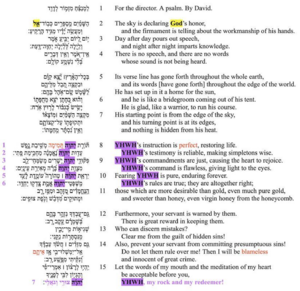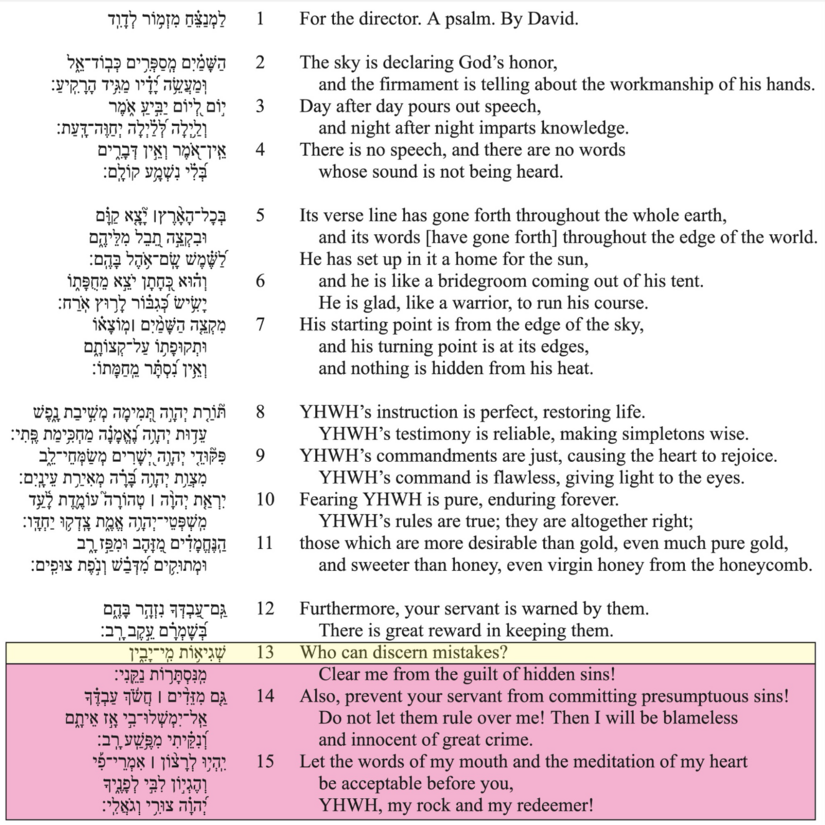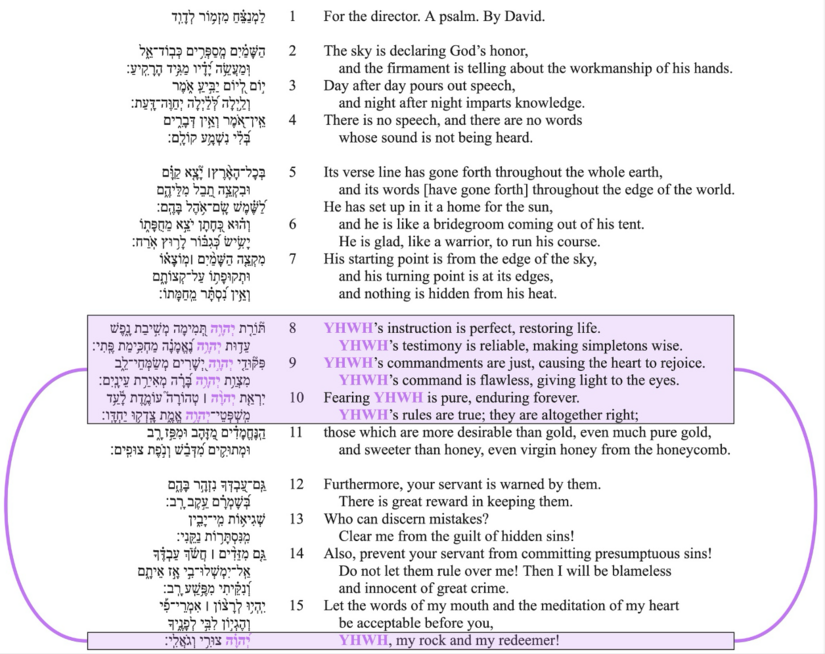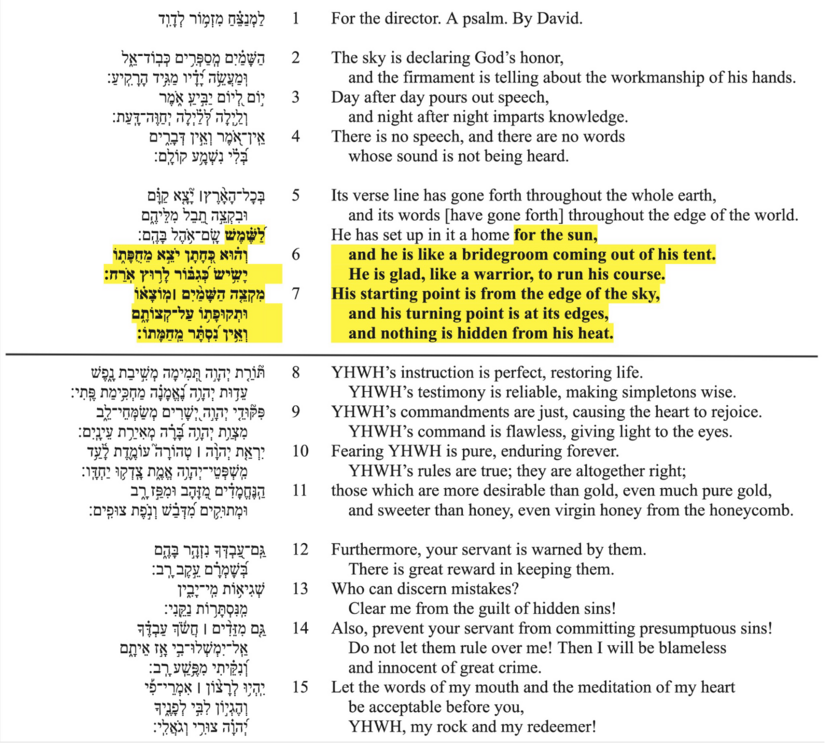Psalm 19/Translation/Tips
The following gives a basic Overview of the Psalm, answering the following questions:
- Title-what title best describes this unique psalm?
- "Nothing is hidden"
- Purpose–why was this psalm written?
- To pray for blamelessness. The psalmist asks YHWH to clear (that is, forgive) him from past sins (v. 13) and for YHWH to help him to remain blameless in the future (v. 14).
- Content–In summary, what is said in this psalm?
- YHWH, make me blameless (verses 12-15)! Your glorious perfection, seen in the sky (verses 2-7) and in your covenant instruction (verses 8-11), exposes my sin and my need for blamelessness.
- Message–what is the general theme of this psalm? What seems to be the main point the psalmist wanted his audience to realize by hearing this psalm?
- In order to be blameless and acceptable, YHWH's people need both his instruction and his redemption.
Every Psalm describes real events. However, many psalms are not written in typical "story" format, with a clear beginning, middle, and end. Here, we attempt to understand the real-life story and background that prompted the psalmist to write.
- Story Behind-What was the real-life story that the psalmist saw himself in? What is the main message/theme conveyed by this "story behind"?
- David has reflected on the words of the sky, which were declaring God's honor. David has reflected on the "perfection" of YHWH's words. Furthermore, nothing is hidden from the sun's heat, and YHWH's instruction is like the sun, so nothing is hidden from the "heat" of YHWH's words. That's how David realizes the sinful inadequacy of his own words. So, David prays to YHWH for forgiveness and protection from sin. YHWH is David's rock and redeemer, and that is why YHWH will make David perfect. When David is perfect, his words and thoughts will be an acceptable sacrifice to YHWH.
- David has reflected on the words of the sky, which were declaring God's honor. David has reflected on the "perfection" of YHWH's words. Furthermore, nothing is hidden from the sun's heat, and YHWH's instruction is like the sun, so nothing is hidden from the "heat" of YHWH's words. That's how David realizes the sinful inadequacy of his own words. So, David prays to YHWH for forgiveness and protection from sin. YHWH is David's rock and redeemer, and that is why YHWH will make David perfect. When David is perfect, his words and thoughts will be an acceptable sacrifice to YHWH.
- Background situation-what are the series of events leading up to the time in which the psalm is spoken?
Knowing the layout of the psalm by sections helps us to understand the progression of thought as the poem progresses. The picture below shows the main “chunks” or pieces of the poem. Verse numbers appear on the left. The second column has a title for each section. The large third column contains a brief summary of the section’s content. As you read through the content column, you will see important words and ideas highlighted in similar colors. The icons on the right may be used as memory aids.
| v. 1 For the director. A psalm. By David. | Superscription | ||
| v. 2 The sky is declaring God’s honor, and the firmament is telling about the workmanship of his hands. | The Words of the Sky | The sky declares God's honor. Not a word of the sky's speech goes unheard. |
|
| v. 3 Day after day pours out speech, and night after night imparts knowledge. | |||
| v. 4 There is no speech, and there are no words whose sound is not being heard. | |||
| v. 5 Its verse line has gone forth throughout the whole earth, and its words [have gone forth] throughout the edge of the world. He has set up in it a home for the sun, | The most brilliant part of the sky is the sun. Nothing is hidden from its heat. |
||
| v. 6 and he is like a bridegroom coming out of his tent. He is glad, like a warrior, to run his course. | |||
| v. 7 His starting point is from the edge of the sky, and his turning point is at its edges, and nothing is hidden from his heat. | |||
| v. 8 YHWH’s instruction is perfect, restoring life. YHWH’s testimony is reliable, making simpletons wise. | The Words of YHWH | YHWH's perfect instruction is like the sun. | |
| v. 9 YHWH’s commandments are just, causing the heart to rejoice. YHWH’s command is flawless, giving light to the eyes. | |||
| v. 10 Fearing YHWH is pure, enduring forever. YHWH’s rules are true; they are altogether right; | |||
| v. 11 those which are more desirable than gold, even much pure gold, and sweeter than honey, even virgin honey from the honeycomb. | |||
| v. 12 Furthermore, your servant is warned by them. There is great reward in keeping them. | The Words of My Mouth | I, your servant, feel the effect of your perfect instruction (just as everything feels the heat of the sun). Make your servant blameless! |
|
| v. 13 Who can discern mistakes? Clear me from the guilt of hidden sins! | |||
| v. 14 Also, prevent your servant from committing presumptuous sins! Do not let them rule over me! Then I will be blameless and innocent of great crime. | |||
| v. 15 Let the words of my mouth and the meditation of my heart be acceptable before you, YHWH, my rock and my redeemer! | Let my words be acceptable, YHWH, my rock and my redeemer! | ||
Progression of Thought-How do the sections of the psalm flow from one to the other?
- The psalm divides into three major sections:
- The first section begins with a report that the skies and days/nights are praising God to the ends of the earth. Then, the sun is described in joyous terms as giving heat that touches everything.
- The second section begins with highly rhythmic verses about the instruction of YHWH and its positive effects.
- In the third section, the psalmist asks to be freed from both intentional and unintentional sin, so that the psalmist's words and thoughts might be acceptable to YHWH.
Part of poetry is communicating emotion. Each section, and even each verse, can contain a number of different emotions. Here are the main emotional themes of each section:
| v. 1 For the director. A psalm. By David. | Superscription | ||
| v. 2 The sky is declaring God’s honor, and the firmament is telling about the workmanship of his hands. | The Words of the Sky | awe | |
| v. 3 Day after day pours out speech, and night after night imparts knowledge. | |||
| v. 4 There is no speech, and there are no words whose sound is not being heard. | |||
| v. 5 Its verse line has gone forth throughout the whole earth, and its words [have gone forth] throughout the edge of the world. He has set up in it a home for the sun, | joy & vulnerability | ||
| v. 6 and he is like a bridegroom coming out of his tent. He is glad, like a warrior, to run his course. | |||
| v. 7 His starting point is from the edge of the sky, and his turning point is at its edges, and nothing is hidden from his heat. | |||
| v. 8 YHWH’s instruction is perfect, restoring life. YHWH’s testimony is reliable, making simpletons wise. | The Words of YHWH | joy & vulnerability | |
| v. 9 YHWH’s commandments are just, causing the heart to rejoice. YHWH’s command is flawless, giving light to the eyes. | |||
| v. 10 Fearing YHWH is pure, enduring forever. YHWH’s rules are true; they are altogether right; | |||
| v. 11 those which are more desirable than gold, even much pure gold, and sweeter than honey, even virgin honey from the honeycomb. | |||
| v. 12 Furthermore, your servant is warned by them. There is great reward in keeping them. | The Words of My Mouth | distress | |
| v. 13 Who can discern mistakes? Clear me from the guilt of hidden sins! | |||
| v. 14 Also, prevent your servant from committing presumptuous sins! Do not let them rule over me! Then I will be blameless and innocent of great crime. | |||
| v. 15 Let the words of my mouth and the meditation of my heart be acceptable before you, YHWH, my rock and my redeemer! | hope | ||
In poetry, it is important to keep track of who is speaking, who is the audience, and what it is that the speaker is trying to do with his words. In the chart below, the left-hand column identifies the speaker, who is David. The right-hand column identifies the audience, which in verses 2-11 is unspecified, while in verses 12-15 is YHWH. The middle column tells what the speaker is trying to do with his words (his speech acts) in each section.
| Speaker | Verses | Macro Speech Acts | Addressee | |||||
|---|---|---|---|---|---|---|---|---|
| v. 1 For the director. A psalm. By David. | ||||||||
| David | v. 2 The sky is declaring God’s honor, and the firmament is telling about the workmanship of his hands. | Description of the Sky (vv. 2–5b) |
Unspecified | |||||
| v. 3 Day after day pours out speech, and night after night imparts knowledge. | The sky communicates God's honor to everyone. | |||||||
| v. 4 There is no speech, and there are no words whose sound is not being heard. | ||||||||
| v. 5ab Its verse line has gone forth throughout the whole earth, and its words [have gone forth] throughout the edge of the world. | ||||||||
| v. 5c He has set up in it a home for the sun, | Description of the Sun (vv. 5c–7) |
|||||||
| v. 6 and he is like a bridegroom coming out of his tent. He is glad, like a warrior, to run his course. | Nothing is hidden from the sun's heat. | |||||||
| v. 7 His starting point is from the edge of the sky, and his turning point is at its edges, and nothing is hidden from his heat. | ||||||||
| v. 8 YHWH’s instruction is perfect, restoring life. YHWH’s testimony is reliable, making simpletons wise. | Praise of YHWH's Instruction (vv. 8–11) |
|||||||
| v. 9 YHWH’s commandments are just, causing the heart to rejoice. YHWH’s command is flawless, giving light to the eyes. | YHWH's instruction is perfect; it is like the sun. | |||||||
| v. 10 Fearing YHWH is pure, enduring forever. YHWH’s rules are true; they are altogether right; | ||||||||
| v. 11 those which are more desirable than gold, even much pure gold, and sweeter than honey, even virgin honey from the honeycomb. | ||||||||
| v. 12 Furthermore, your servant is warned by them. There is great reward in keeping them. | Prayer for Blamelessness (vv. 12–15) |
YHWH | ||||||
| v. 13 Who can discern mistakes? Clear me from the guilt of hidden sins! | "Let the words of my mouth and the meditation of my heart be acceptable before you." | |||||||
| v. 14 Also, prevent your servant from committing presumptuous sins! Do not let them rule over me! Then I will be blameless and innocent of great crime. | ||||||||
| v. 15 Let the words of my mouth and the meditation of my heart be acceptable before you, YHWH, my rock and my redeemer! | ||||||||
- In Scripture, the number 7 denotes perfection. Psalm 19 contains the divine name YHWH a perfect seven times.
- The occurrences of YHWH and God combine to make one of the most important poetic features of the psalm, and the psalmist meant to distinguish them from one another. So, translators should be very careful about rendering these words faithfully.
Note in the following diagram where YHWH (highlighted in purple) and God (highlighted in yellow) appear:
The appearances of YHWH and God display a progression in the knowledge of God:
- The first line of the psalm uses the common noun God (אֵל, verse 2). This word was used not only by Israel but also by Israel's neighbors for the highest, creator God. So, at this point, early in the psalm, the knowledge of God is general, rather hazy, and ill-defined. This God, whoever he is, is the creator of heaven and earth.
- The second half of the psalm, however, refers to this God by his personal name YHWH.[1] Only Israel used this name for God. The divine name YHWH clusters in verses 8-10, occurring six times within the space of six lines. This section of verses identifies YHWH as the God whose covenant instruction is perfect (verse 8).
- Despite the emphasis on perfection, however, there remains in the psalm a glaring imperfection as the psalm progresses. It is significant that the number seven signifies completeness,[2] especially in this psalm where the idea of completeness is a prominent theme.[3] The fact that YHWH's name occurs only six times in verses 8-10 creates tension and leaves the audience expecting something more in verses 11-14. The tension is resolved in the final line of the psalm, where YHWH's name is mentioned for the seventh time. This time, however, YHWH is not described as the one who commands his people, but as the one who protects and redeems them ("my rock and my redeemer"). In other words, God is not only the creator of heaven and earth (verses 2-7), he is also the personal God of Israel who has given covenant instruction to his people (verses 8-10). But even this description is 'incomplete.' In fact, YHWH not only teaches his people how to be blameless, he also makes them blameless by forgiving their hidden sins (verse 13) and protecting them from presumptuous sins (verse 14), as their rock and redeemer (verse 15).
It is also important to consider how the author chose to draw attention to certain parts of the psalm. Here are the parts of the psalm that we believe are most prominent, and thus should be most prominent in a performance of the psalm.
The most prominent part of Psalm 19 is verses 13-15:
- These verses focus on the application of YHWH's instruction to the speaker's life (also verse 12).
- Verses 2-11 are positive in nature, but the tone shifts significantly in verses 12-15. This final section contains vocabulary regarding error, guilt and sin, and pleas for forgiveness and protection.
- Verses 13-15 begin with a question, which is the only question in the psalm. The psalm then transitions into a series of direct requests to YHWH.
The second-most prominent part of the psalm is verses 8-10:
- The theme is YHWH's instruction.
- Verses 8-10 contain six of the seven instances of the divine name YHWH. The name occurs in every clause of this section, but nowhere before this section. YHWH occurs one more time in the final clause of the psalm for a perfect seven.
- Each clause is highly rhythmic, with the usual order:
- YHWH's instruction, then
- a single positive adjective, then
- a 2-word positive phrase describing what the instruction does.
The third-most prominent part of the psalm is verses 5c-7:
- The topic is the sun. The psalmist uses two images to describe the sun: a bridegroom and a warrior.
- The psalmist connects the sun to YHWH's instruction.









